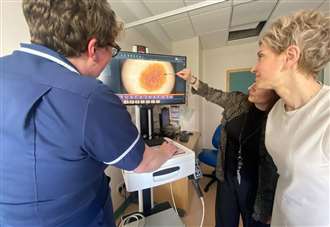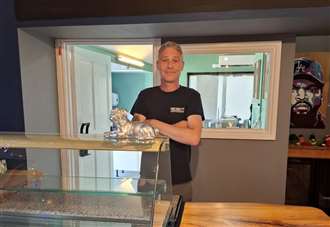-
 play_arrow
play_arrow
Kl 1 Radio Local radio for west Norfolk
-
 play_arrow
play_arrow
KL DISCO KL Disco Playing Disco Music from the 70's onwards.24/7
-
 play_arrow
play_arrow
KL COUNTRY KL COUNTRY Playing New and Classic Country Music 24/7
-
 play_arrow
play_arrow
KL ROX KL ROX The best of New and Classic Rock.24/7
-
 play_arrow
play_arrow
KL SUMMER Summer Vibes 24/7 from KL1 Radio across West Norfolk
-
 play_arrow
play_arrow
KL CLASSICAL Your Symphony Starts Here
-
 play_arrow
play_arrow
KL CHILL Just Chill!
-
 play_arrow
play_arrow
KL POP The Best POP Hits all day Long!
-
 play_arrow
play_arrow
KL XTRA KL XTRA
music_note

Lynn’s Queen Elizabeth Hospital has taken a significant step forward in the early detection of skin cancer with the launch of a full body mole mapping clinic.The pioneering service, which welcomed its first patient last month, is specifically designed to monitor individuals at higher risk of developing skin cancer, particularly melanoma.Skin cancer remains one of the most common forms of cancer worldwide, but the new clinic at QEH leverages cutting-edge technology in a bid to stay ahead of the disease.
At the heart of the new service is the FotoFinder ATBM Master system – an advanced imaging technology that captures high-resolution photographs of the entire body and individual moles.Dr Simina Stefanescu, clinical lead for dermatology at the QEH, said: “This new clinic offers a detailed way of monitoring high-risk patients who are at increased risk of melanoma.”By comparing images over time, we can spot small changes early and make more informed decisions about whether treatment is needed.” The FotoFinder system is being piloted by Dr Boyana Pedersen, a skin MDT lead clinician, and is supported by skin cancer specialist nurse Laura Shaw.Dr Pedersen said: “The technology captures high-quality images of lesions on the whole body and uses dermoscopy to photograph individual suspicious moles. “This consistent and detailed approach enables us to monitor skin health accurately over time and intervene when necessary.”CNS Laura Shaw added: “It enhances our ability to detect early-stage melanoma and gives reassurance to our high-risk patients, who benefit from ongoing, precise monitoring.”The new mole mapping service is available to patients who are already under the care of QEH’s dermatology team and who meet specific medical criteria for enhanced surveillance. Rebecca Martin, medical director at the QEH, added: “We know how important early detection is when it comes to skin cancer.”This service gives our patients access to the latest technology, helping us to monitor their skin more closely and act quickly when needed.”
Similar posts
Upcoming shows

Night Trax
12:00 am - 7:00 am

Paul Baker – KL1 Breakfast
7:00 am - 10:00 am

Chris Fisher – KL1 Mornings
10:00 am - 1:00 pm

Tim Lee – KL1 Afternoons
1:00 pm - 4:00 pm

Richard Dix – KL1 Drive
4:00 pm - 7:00 pm
-

Man arrested after knife threats is also suspected of intentional strangulation

Vegan restaurant closes for good despite reopening less than two months ago

Air ambulance lands in town during medical emergency

Man arrested on suspicion of breaking into Windsor Castle grounds

Prison officers told to wear body armour in high security jails after attacks
Message Us
Copyright The Mediasite UK - 2025



